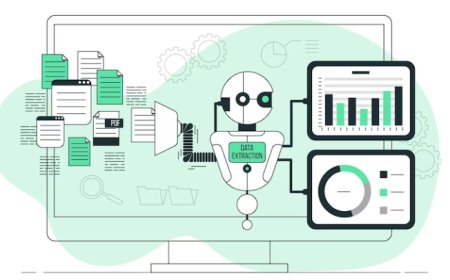Machine Learning Jobs for New Graduates
Explore machine learning jobs for new graduates, offering entry-level opportunities in data science, AI, and software development.

For recent graduates in particular, entering into the field of Machine Learning may be both exciting and challenging. you may be wondering what career paths are available to you and how to get your first job in this Machine learning industry. Fresh graduates are finding more and more opportunities in machine learning as companies in some sectors look to use data knowledge to improve their operations. where to look for these opportunities, how to get ready, and what to expect. So, if you're interested in learning more about Machine Learning Jobs for New Graduates, keep on reading to learn the important steps you take to start your career in this interesting field.
Understanding the Job Situation for Recent Graduates in Machine Learning
The field of machine learning is growing fast, having applications in finance, healthcare, and even entertainment. Recent graduates need to understand the machine learning job landscape. These jobs frequently call for a combination of problem-solving skills, technical expertise, and an interest to always learn new things.
Important Skills for New Graduates
When finding a job in machine learning as a recent graduate, some various essential abilities and proficiencies will help you stand out:
-
Programming Proficiency: It's frequently necessary to be proficient in languages like Python or R. Processing data and creating Machine Learning Models are two common uses for these languages.
-
Knowledge of Algorithms: It's important to have a strong understanding of machine learning algorithms, such as neural networks, decision trees, and support vector machines. With this knowledge, you may select and apply the appropriate model for a given task.
-
Data handling: The ability to clean, manipulate, and visualize data is important. Before being employed in a model, raw data is often the first step in machine learning activities.
-
Knowledge of Statistics: Analyzing data and machine learning model performance requires an understanding of statistics. It can be helpful to understand ideas like probability distributions and hypothesis testing.
-
Problem-Solving Ability: Machine learning frequently involves focusing on challenging issues and coming up with creative fixes. It is important to have strong analytical and problem-solving abilities.
Building a Strong Foundation in Machine Learning
Fresh graduates should focus on building a strong foundation in these areas to compete in the job market. This might involve taking more classes, working on side projects, or doing internships. Employers frequently place great importance on practical experience.
AI Career Pathways
New graduates could be thinking about the following important Artificial Intelligence professions in addition to machine learning roles:
-
Jobs in AI development: These positions entail the creation and improvement of AI technology, such as developing algorithms and improving pre-existing models.
-
AI Engineering Roles: AI engineers work to ensure that systems are scalable and efficient by constructing the infrastructure required for AI applications.
-
Data Analyst in AI: uses statistical tools and techniques to analyze and interpret data to support decisions that are driven by AI.
-
AI Research Positions: Investigating novel algorithms and technologies is the focus of these roles for individuals who are interested in developing the subject.
Finding Machine Learning Jobs for New Graduates
Where then may recent graduates find machine learning jobs? Here are some directions to investigate:
Job Boards and Websites
-
LinkedIn: When looking for a job, LinkedIn is a terrific resource. Make use of the platform to network with industry experts and look for entry-level machine learning jobs.
-
Indeed: This employment search site frequently provides a plethora of machine-learning chances for recent graduates. To narrow down your search to entry-level jobs, use filters.
-
Glassdoor: In addition to listing positions, Glassdoor also offers information about compensation expectations and business cultures, which can be helpful while looking for a job.
-
Specialized Job Boards: Job ads for positions in data science and machine learning are available on websites such as DataCamp and Kaggle.
Networking and Professional Associations
Networking is another powerful tool. Joining professional associations like the Association for Computing Machinery (ACM) or attending meetups and conferences can help you connect with potential employers and learn about job openings.
Internships and Research Projects
Internships and research projects are excellent ways to gain hands-on experience and build your resume. Many organizations offer internships that can lead to full-time positions, and research projects can showcase your skills to potential employers. Look for AI internship opportunities or roles that involve AI project management to gain practical experience.
Making an Eye-Catching Cover Letter and Resume
Applying for fresh graduate machine learning employment requires both a cover letter and résumé. The following advice will help them stand out:
Resume Tips
- Highlight Relevant Skills: Emphasize your programming skills, knowledge of algorithms, and any projects or internships related to machine learning.
- Showcase Projects: Include details about any machine learning projects you’ve worked on, including the tools and techniques you used and the results you achieved.
- Education and Certifications: Mention your degree, relevant coursework, and any certifications in machine learning or related areas.
Tips for Cover Letters
-
Customize It: Make your cover letter specific to every job application. Explain your interest in the company and how your qualifications fit the job specifications.
-
Show Passion: Express your excitement for the field of machine learning and your desire to make a positive impact on the organization.
-
Give concrete instances: To show your capabilities and problem-solving abilities, give specific examples from your experience.
Preparing for Interviews
-
Review Common Questions: Practice answering common machine learning interview questions. These might include technical questions about algorithms and problem-solving scenarios.
-
Showcase Your Projects: Be ready to discuss the projects listed on your resume. Explain your approach, the challenges you faced, and how you overcame them.
-
Brush Up on Basics: Ensure you have a good understanding of the fundamental concepts and techniques used in machine learning.
-
Ask Questions: Prepare thoughtful questions about the role, team, and company. This demonstrates your interest and helps you assess if the job is a good fit for you.
Career Growth and Development
-
Continuous Learning: Machine learning is a fast-paced field. Stay updated with the latest trends, tools, and techniques through online courses, workshops, and conferences. Look into advanced roles like AI data scientist or AI solutions architect as you progress.
-
Seek Feedback: Regular feedback from colleagues and mentors can help you improve your skills and advance in your career.
-
Explore Specializations: As you gain experience, consider specializing in areas such as Deep Learning, predictive analytics, or Natural Language Processing.
-
Build a Portfolio: A strong portfolio showcasing your projects and achievements can be valuable for career advancement and job transitions.
-
Consider AI Consultant Roles: For those looking to provide strategic guidance on AI implementation and technology integration, AI consultant roles might be a good fit.
Jobs in machine learning are interesting and available to new graduates in a subject that is growing. You can position yourself for success by developing your required abilities, making use of resources for job searches, and carefully preparing for applications and interviews. To grow successfully and have a big influence in the machine learning field, accept continuous learning and maintain your interest in the subject.
Getting a job in this industry can be a great beginning to a bright career if you have the right mindset and determination. The options are endless, whether your goal is to work as an AI software developer, investigate AI development opportunities, or follow a career in data analysis.





































